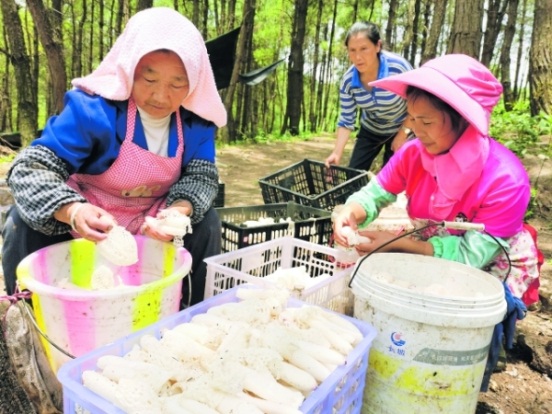Guiyang's mushroom business lifts villagers from poverty

Workers of Guizhou Yunfeng Mushroom Co process mushrooms they sowed last year at the firm's edible fungus planting demonstration base. [Photo/Guiyang news network]
Guiyang in Southwest China's Guizhou province in recent years has been adhering to a high-end, green, and intensive development approach in its mushroom industry, making efforts to build two centers (the provincial edible fungus research center and the provincial edible fungus breeding center) and four parks (the modern edible fungus efficient production demonstration park, the edible fungus deep and fine processing park, the precious wild fungus breeding demonstration park, and the edible fungus cultural tourism integration park).
The city has also been striving to establish a strong mushroom industrial framework with four systems – a quality safety management system, a modern production and operation system, a modern logistics market system, and a supporting system.
Through years of strenuous work, Guiyang has successfully cultivated the most commonplace fungi, such as lentinus edodes and oyster mushrooms, as well as more precious edible fungi, including morchella esculenta and black truffles.
The healthy and rapid development of the mushroom industry has greatly accelerated poverty alleviation in Guiyang. By 2020, the city had planted 24,000 mu (1,600 hectares) of mushrooms, 13.8 times more than the mushroom planting space at the end of the 12th Five-Year Plan period (2011-15). Total mushroom output reached 86,000 metric tons.
"We have 50 smart trial buildings for mushroom species on trial. The rooms in the building cannot only raise the level of automation during the planting process, but also save land for other uses. They guarantee a stable mushroom output annually," said Xiao Yongdong, general manager of Guizhou Kaidong Tech Co. The company has established the first edible fungus intelligent planting demonstration base in Baiyun district, which offers full automatic controls over all environmental conditions, such as temperature and moisture.
In addition to Baiyun district, Kaiyang county and Qingzhen have also made similar commitments, increasing incomes for nearly 20,000 rural households and helping them shake off poverty.
In order to extend the mushroom industrial chain and take full advantage of its mushrooms, Guiyang has diversified its edible fungus products and integrated production, processing, and marketing.
Guiyang has formed guidelines to stabilize the local market and expand the outside market by promoting edible fungus technical standards, creating popular local mushroom brands and products and building modern logistics markets that mainly feature the edible fungus wholesale markets and the fungus breeding material trading market.
Moving forward, Guiyang's mushroom industry will make full use of its advantages in talent, traffic, and consumer markets, and step up efforts to enhance the research, mass production, fine and deep processing, and cold-chain logistics of edible fungus in order to drive the high-quality development of the industry.
Presented by China Daily.
黔ICP备05001922号-3
